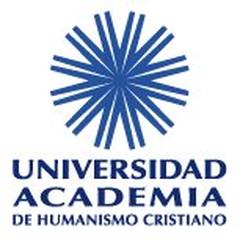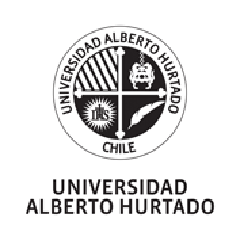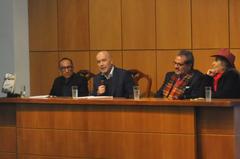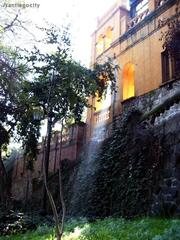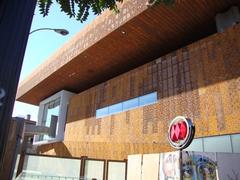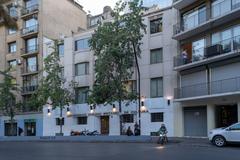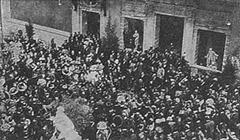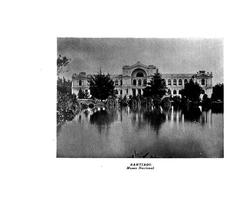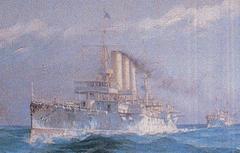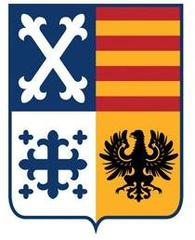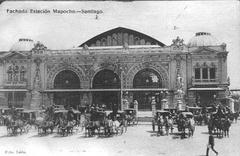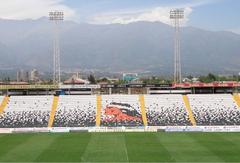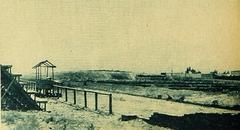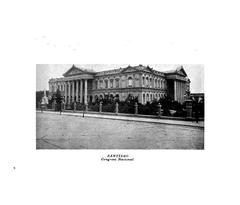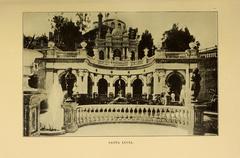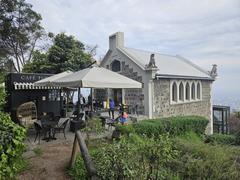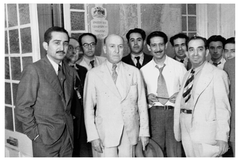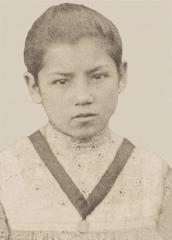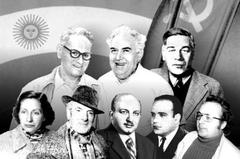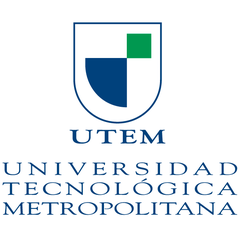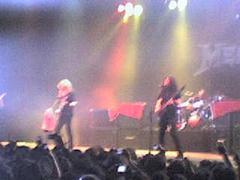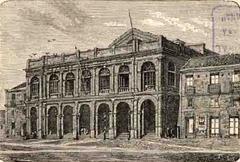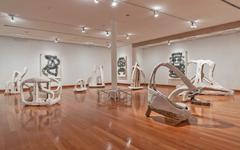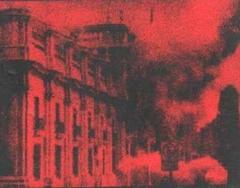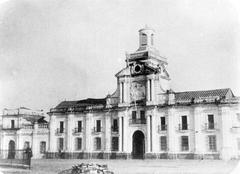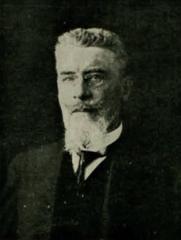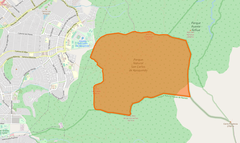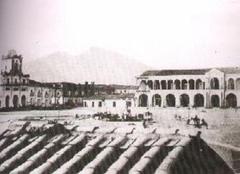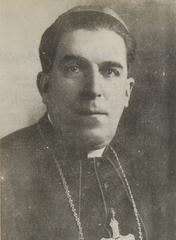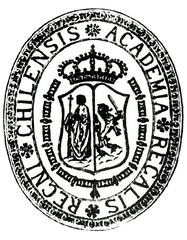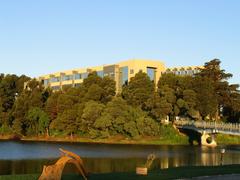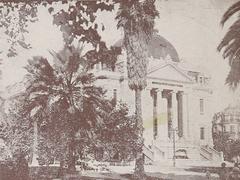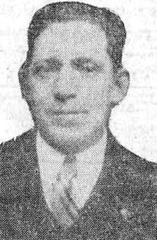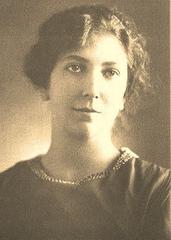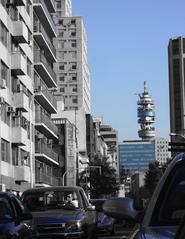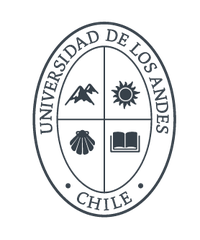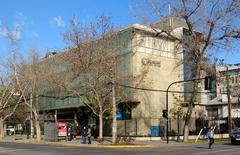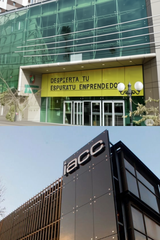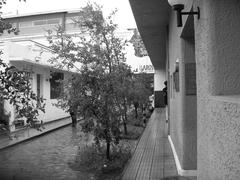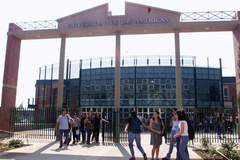Universidad La República Santiago Chile: Visiting Hours, Tickets, and Historical Sites Guide
Date: 04/07/2025
Introduction
Nestled in the lively center of Santiago, Universidad La República (ULARE) stands as a cultural and educational beacon, offering visitors a unique insight into Chile’s academic life and urban character. Since its founding in 1989 during a period of significant growth in private higher education, ULARE has built a reputation for innovative academic offerings and a steadfast commitment to social responsibility. Its campus not only serves as a hub for learning but also as a landmark within the city’s historic and cultural core, placing visitors steps away from some of Santiago’s most prominent attractions.
Whether you are a prospective student, traveler, or culturally curious guest, a visit to ULARE presents an opportunity to explore where education, community engagement, and the city’s vibrant identity intersect. This comprehensive guide will help you plan your visit, covering essential information such as location, visiting hours, guided tours, accessibility, travel tips, and nearby landmarks to ensure an enriching experience.
For further details or to arrange your visit, consult the official Universidad La República website (ULARE official site).
Table of Contents
- Introduction
- Historical and Cultural Significance
- Visitor Information
- Exploring the Campus
- Travel Tips and Accessibility
- Nearby Attractions and Cultural Sites
- Frequently Asked Questions (FAQ)
- Conclusion
Historical and Cultural Significance
ULARE was established in 1989, reflecting the broader expansion of private universities in Chile. It has since evolved into a respected institution, notable for its dedication to professional training, community service, and social engagement. The university operates legal and health clinics as part of its real-world contribution to local welfare, highlighting its integration with the city’s social fabric.
Its central downtown location situates ULARE among Santiago’s most notable districts, making it a key site for both academic and cultural exploration.
Visitor Information
Location:
Universidad La República’s Casa Central is located at Agustinas 1831, Santiago. It is easily accessible by public transportation, including the Metro (Estación Metro República) and numerous bus lines. Taxis and ride-hailing services are also available for direct access.
Visiting Hours:
The campus is open to visitors Monday through Friday, 8:00 AM to 6:00 PM. Visitors should check in at the main administrative office upon arrival.
Entry and Tickets:
Admission to the campus is free. Registration at the entrance is required for security purposes. While most public areas are accessible, guided tours—especially of specialized facilities like the legal clinic—should be arranged in advance and may incur a nominal fee.
Guided Tours:
Tours are available by appointment and typically include visits to the legal clinic, library, and simulation centers, offering an insider’s perspective on academic programs and community services.
Exploring the Campus
Architectural Highlights
The university’s Santiago campus features a blend of functional modern architecture and collaborative spaces, including lecture halls, seminar rooms, and specialized laboratories. The design supports a vibrant academic community while inviting visitors to experience its distinctive atmosphere.
Visitor Facilities
- Reception Desk: Staffed during business hours to assist with information and directions.
- Wi-Fi Access: Complimentary for registered visitors throughout the campus.
- Accessibility: Ramps, elevators, and adapted restrooms ensure the campus is accessible to all guests.
Travel Tips and Accessibility
- Best Times to Visit: Weekdays are ideal, with full university operations in progress.
- Language: While Spanish is the primary language, some staff can assist English-speaking visitors.
- Dress Code: Casual attire is suitable; dress appropriately for official events.
- Safety: Santiago is generally safe, but standard precautions are advised.
- Communication: WhatsApp is widely used for arranging tours or inquiries.
ULARE’s facilities are designed to accommodate visitors with disabilities, and staff are available for additional assistance if needed.
Nearby Attractions and Cultural Sites
ULARE’s central location places it within walking distance of several of Santiago’s most significant landmarks:
- Plaza de Armas: The city’s historical main square, vibrant with activity and colonial architecture.
- Metropolitan Cathedral: A stunning example of neoclassical design open to visitors during designated hours.
- Museo Histórico Nacional: The National History Museum, documenting Chile’s past.
- National Museum of Fine Arts: Showcasing Chilean and international art.
- Cerro Santa Lucía: A scenic hill offering panoramic views and historical monuments.
These sites allow visitors to enrich their campus visit with broader cultural exploration.
Frequently Asked Questions (FAQ)
Q: Is there an admission fee to visit Universidad La República?
A: No, campus visits are free of charge.
Q: Can tourists access the university’s legal clinic?
A: The legal clinic mainly serves the local community, but tours can be arranged by appointment for those interested in learning about its work.
Q: Are there parking facilities available?
A: Parking is limited in the city center; public transportation is recommended.
Q: Is photography allowed on campus?
A: Photography is permitted in public areas. Permission may be required for special events or inside certain facilities.
Q: Can visitors access the library or academic spaces?
A: Public areas and the library are often accessible during open hours, though some facilities may have restrictions.
Conclusion
Universidad La República is more than an academic institution—it is a vibrant cultural and urban landmark in Santiago. Its free admission policy, welcoming environment, and proximity to iconic city attractions make it an excellent addition to any Santiago itinerary. Whether you are interested in architecture, community initiatives, or simply experiencing the rhythm of downtown Santiago, ULARE offers valuable insights into Chilean society and education.
For the latest information on visiting hours, special events, and tour arrangements, visit the ULARE official site.
Visiting Cerro Santa Lucía: Hours, Tickets, and Travel Guide
Introduction
Cerro Santa Lucía is one of Santiago’s most iconic historical locations, providing visitors with a blend of landscaped gardens, colonial history, and panoramic city views. Located in the heart of Santiago, it attracts both tourists and locals seeking cultural experiences and relaxation.
History
Once known to the indigenous Mapuche as Huelén, the hill was renamed Cerro Santa Lucía in 1541 by Pedro de Valdivia on the feast day of Saint Lucy. Over time, it transformed from a military fortification to a beautifully landscaped park featuring neoclassical architecture, fountains, and stairways designed in the 19th century.
Visiting Hours and Tickets
- Open Daily: 9:00 AM – 6:00 PM (extended to 8:00 PM in summer).
- Admission: Free; no tickets required.
- Guided Tours: Available for a fee, bookable via the official Santiago tourism website or local operators.
Accessibility and Facilities
- Pathways: Paved, but steep in places—may challenge those with mobility issues.
- Amenities: Benches, shaded areas, and public restrooms are available.
- Family/Pet Friendly: Suitable for children and pets. Bring water and wear comfortable shoes, especially in summer.
Guided Tours and Events
Guided tours offer historical context and access to features such as Castillo Hidalgo and terraced gardens. Cultural events, including concerts and exhibitions, are held particularly during summer—check the event calendar before visiting.
Nearby Attractions
Cerro Santa Lucía is close to Plaza de Armas, the National Museum of Fine Arts, and Mercado Central. The Lastarria neighborhood offers excellent dining and café options nearby.
Photography
The summit provides breathtaking views of Santiago’s skyline and the Andes. Ornate fountains, staircases, and gardens make for excellent photos.
Travel Tips
- Visit early or late to avoid crowds and heat.
- Combine with nearby sites for a full day in Santiago’s cultural center.
- Use public transport due to limited parking.
- Bring sunscreen and a hat in warmer months.
FAQ
Q: Is there an entrance fee?
A: No, entry is free.
Q: Are guided tours available?
A: Yes, for a fee.
Q: Is it wheelchair accessible?
A: Some areas are, but steep paths may limit access.
Q: What are the best times to visit?
A: Early morning or late afternoon.
Q: Can I visit at night?
A: Open until 8:00 PM in summer, 6:00 PM otherwise.
Plan Your Visit
For updates on hours, events, and tours, check Santiago’s official tourism resources or download the Audiala app.
Plaza de Armas in Santiago: Visitor Information and Tips
Introduction
Plaza de Armas is the historic nucleus of Santiago, surrounded by architectural gems and bustling activity. The square is a focal point for culture and history, making it a top destination for visitors.
Visiting Hours and Tickets
- Plaza de Armas: Open 24/7.
- Metropolitan Cathedral: Mon-Fri 9:00 AM – 7:00 PM, weekends 10:00 AM – 6:00 PM.
- Museo Histórico Nacional: Tue–Sun 10:00 AM – 5:00 PM (closed Mondays).
- Admission: Plaza and Cathedral are free; the museum charges a small fee.
Guided Tours
Walking tours are available, often including adjacent monuments and historical context.
Highlights
- Metropolitan Cathedral: Neoclassical façade and ornate interior.
- Pedro de Valdivia Monument: Honors Santiago’s founder.
- Historic Buildings: Colonial architecture and vibrant street life.
- Markets and Performers: Local culture on display.
Safety and Accessibility
Daytime visits are safe; be vigilant with belongings. The area is wheelchair accessible.
Getting There
- Metro: Plaza de Armas station (Line 5).
- Bus/Taxi: Widely available.
- From Airport: Taxi or shuttle, about 30 minutes.
Seasonal Tips
Visit in spring or fall for milder weather and smaller crowds; dress in layers.
FAQ
Q: Is entry to Plaza de Armas free?
A: Yes. Some museums nearby may charge a small fee.
Q: Are guided tours available?
A: Yes; several companies offer them.
Q: Can I visit the Cathedral?
A: Yes, during its open hours.
Conclusion
Plaza de Armas offers a rich cultural experience through its history, architecture, and surrounding neighborhoods. Plan your visit by checking schedules and considering a guided tour for deeper context.
For more details, visit Santiago’s official tourism site or download the Audiala app.
Summary and Final Travel Advice
Universidad La República is an essential stop for those exploring Santiago’s educational and cultural scene. Its welcoming campus, free admission, and proximity to major attractions offer a rewarding experience that extends beyond traditional sightseeing. Combine your visit to ULARE with nearby sites like Plaza de Armas, Cerro Santa Lucía, and the Metropolitan Cathedral for a comprehensive understanding of Santiago’s heritage.
To stay updated on hours, events, and guided tours, consult the ULARE official site and Santiago’s tourism resources.
References
- Visiting Universidad La República: A Cultural and Educational Landmark in Santiago, 2025
- Visiting Universidad La República: A Guide to Exploring Santiago’s Academic Landmark, 2025
